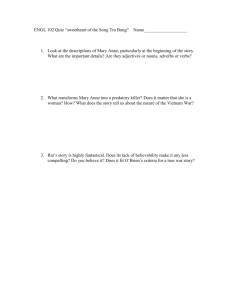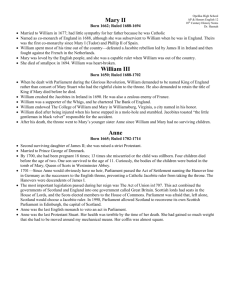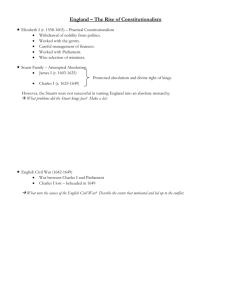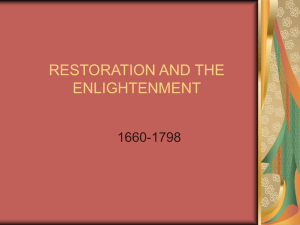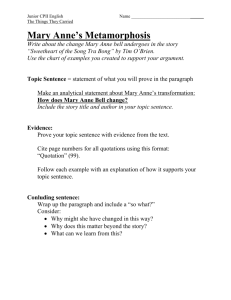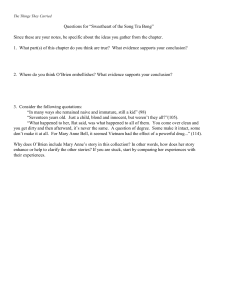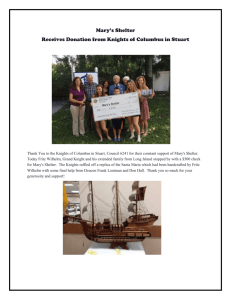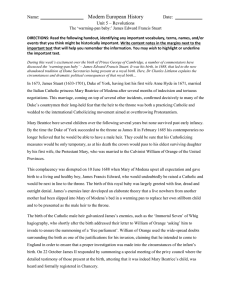Restoration to Glorious Revolution
advertisement
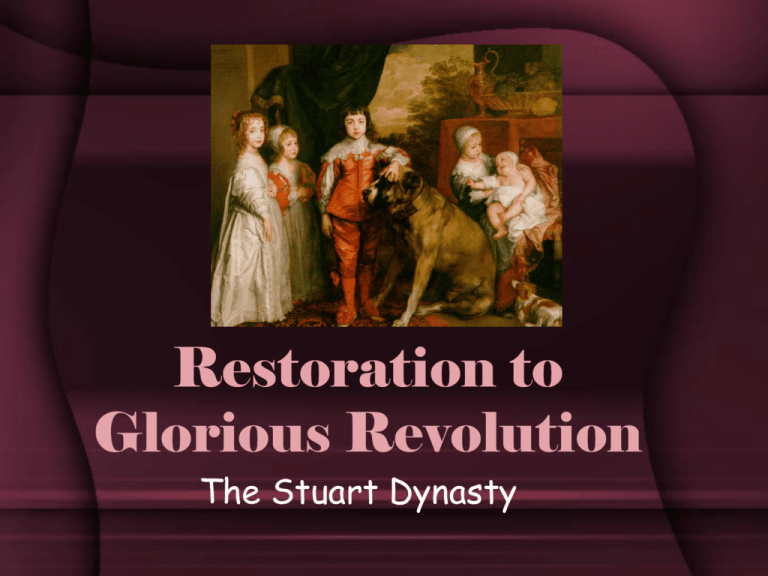
Restoration to Glorious Revolution The Stuart Dynasty The Stuart Monarchy James I [r. 1603-1625] Son of Mary Stuart, Queen of Scots, who had been beheaded by Elizabeth 1st His reign united England and Scotland = Great Britain Charles I [r. 1625-1649] The Petition of Rights, 1628 “The Stuart Magna Carta” The Beheading of Charles I, 1649 Oliver Cromwell † Lord Protector [1654-1658] King Charles II [r. 1660-1685] Had charm, poise, & political skills. Restored theaters and reopened pubs and brothels closed by Cromwell Favored religious toleration. Realized he could not repeat mistakes of his father . The Restoration 1673 Test Act excluded all but Anglicans from gov’t positions. 1679 Habeas Corpus Act Parliamentary Politics Tories: supporters of Charles II Whigs: His Critics James, Duke of York Catholic Married Anne Hyde Haunted by his father’s death Repeated mistakes of his father King James II [r. 1685-1688] Zealous Catholic Convert Remarried to Marie Beatrice of Modena, Catholic Stuart Princesses: Heirs to the Throne Mary Anne Raised as Good Protestants King James II [r. 1685-1688] Suspended Test Act Appointed Catholics Arrested Anglican Bishops Who Refused to read Toleration Proclamation 1688 – Marie Beatrice gave birth to a son “Warming Pan Baby” William of Orange Mary Stuart married William of Orange Anne wrote to Mary telling her to claim the throne “Glorious” Revolution: 1688 Whig & Tory leaders offered throne jointly to Mary & William of Orange. He was enemy of Louis XIV. He was champion of Protestant cause. English Bill of Rights [1689] Settled power struggle between King & Parliament. Expanded civil liberties in England. English Bill of Rights [1689] 1. The King could not suspend the operation of laws. 2. The King could not interfere with the ordinary course of justice. 3. No taxes levied or standard army maintained in peacetime without Parliament’s consent. 4. Freedom of speech in Parliament. 5. Sessions of Parliament would be held frequently. 6. Subjects had the right of bail, petition, and freedom from excessive fines and cruel and unusual punishment. 7. The monarch must be a Protestant. 8. Freedom from arbitrary arrest, habeas corpus. 9. Censorship of press was dropped. 10. Religious toleration. The Rest of the Story • Anne became Queen when William died in 1702 • Although she was pregnant 17 times, none of her children will survive her. • Died in 1714, bitter but determined to keep her brother from the throne. George I [1714-1727] • Great Grandson to James I • House of Hanover • “German George” The Stuart Monarchy The Pretenders James Francis Edward Their Efforts End at Battle of Culloden, 1745 Bonnie Prince Charlie
